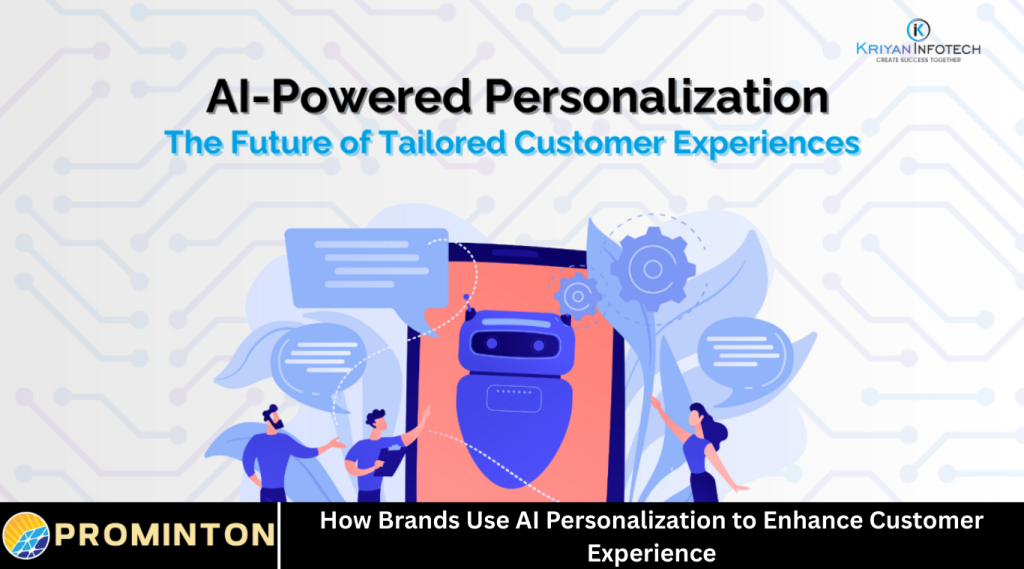In today’s digital world, customers expect personalized experiences from the brands they interact with. Personalization means tailoring products, services, and communications to meet individual preferences and needs. Artificial intelligence, or AI, has become a powerful tool for brands to achieve this personalization at scale.
AI uses data and machine learning algorithms to understand customer behavior and preferences. This allows brands to deliver relevant recommendations, offers, and support in real-time. This article explores how brands are using AI personalization to improve customer experience and build stronger relationships.
What is AI Personalization?
AI personalization is the use of artificial intelligence technologies to customize interactions and content based on individual customer data. It goes beyond simple rule-based personalization by learning from customer behavior and predicting what they might want next.
This technology analyzes large amounts of data, including browsing history, purchase behavior, demographics, and even social media activity. AI then uses this information to create personalized experiences that feel natural and engaging
Why AI Personalization Matters for Brands
Personalization helps brands stand out in a crowded market. Customers are more likely to stay loyal to brands that understand their needs and preferences. AI personalization makes this possible at scale and with great accuracy.
Personalized experiences lead to higher customer satisfaction and increased sales. Brands can offer relevant products or services at the right time, improving conversion rates. Moreover, AI can help reduce marketing costs by targeting only the most interested customers.
How Brands Use AI Personalization
Brands are applying AI personalization in many ways to enhance customer experience. Here are some key areas where AI plays a vital role:
Personalized Recommendations
One of the most common uses of AI personalization is product or content recommendations. E-commerce websites, streaming services, and news platforms suggest items based on previous behavior and preferences. This helps customers discover products they are likely to enjoy.
Dynamic Content and Offers
AI enables brands to customize website content, emails, and advertisements dynamically. For example, a visitor to an online store might see different home page banners or special offers based on their location, browsing history, or purchase history.
Chatbots and Virtual Assistants
Many brands use AI-powered chatbots to provide personalized customer support. These bots understand customer queries and offer relevant answers or solutions. They can also guide customers through product choices or troubleshoot problems.
Personalized Email Marketing
AI helps create tailored email campaigns that speak directly to individual interests. Instead of sending generic messages, brands use AI to choose the best time to send emails, personalize subject lines, and recommend products within the email.
Customer Journey Mapping
AI analyzes customer data to understand how different customers interact with the brand across multiple channels. This helps brands personalize the entire journey, from first contact to purchase and beyond, ensuring a seamless experience.
Benefits of AI Personalization for Customers
Customers enjoy many benefits from AI-driven personalization:
- Relevant product recommendations save time and effort
- Customized content keeps customers engaged
- Faster and more accurate customer support improves satisfaction
- Personalized offers and discounts provide better value
- Seamless experiences across channels make interactions smoother
These benefits help build trust and loyalty between customers and brands.
Benefits of AI Personalization for Brands
Brands gain several advantages by implementing AI personalization:
- Increased sales and higher conversion rates
- Improved customer retention and loyalty
- Better understanding of customer preferences and behavior
- Efficient marketing spend with targeted campaigns
- Enhanced brand reputation through superior customer experience
Challenges of AI Personalization
Despite its benefits, AI personalization comes with challenges:
Data Privacy Concerns
Collecting and using personal data raises privacy issues. Brands must ensure compliance with regulations and be transparent about data usage.
Data Quality and Integration
Effective AI personalization requires clean, well-organized data from multiple sources. Integrating this data can be complex.
Avoiding Over-Personalization
Too much personalization can feel intrusive or creepy to customers. Brands need to strike a balance between helpful and overwhelming.
Technical Complexity
Implementing AI personalization requires skilled professionals and robust technology infrastructure, which can be costly.
Best Practices for Using AI Personalization
To get the most out of AI personalization, brands should follow these best practices:
- Be transparent with customers about data collection and usage
- Use data ethically and respect privacy regulations
- Focus on delivering real value through personalization
- Continuously test and optimize personalization strategies
- Combine AI insights with human creativity for the best results
- Ensure personalization is consistent across all customer touchpoints
Future of AI Personalization in Customer Experience
The future of AI personalization looks promising. Advances in AI will enable even deeper understanding of customer emotions and intentions. Brands will be able to offer hyper-personalized experiences that feel human and intuitive.
Emerging technologies like voice assistants, augmented reality, and the Internet of Things will further enhance personalized interactions. As AI evolves, brands that embrace personalization will have a significant competitive advantage.
Frequently Asked Questions
What is AI personalization in customer experience?
AI personalization uses artificial intelligence to customize interactions, content, and offers based on individual customer data.
How does AI personalization benefit customers?
It provides relevant recommendations, faster support, personalized offers, and seamless experiences that meet customer needs.
What data do brands use for AI personalization?
Brands use data like browsing history, purchase behavior, demographics, and sometimes social media activity to personalize experiences.
Are there privacy concerns with AI personalization?
Yes, brands must protect customer data, comply with privacy laws, and be transparent about data use to maintain trust.
Can AI personalization improve sales?
Yes, personalized experiences lead to higher conversion rates, increased sales, and better customer retention.
How do chatbots use AI personalization?
Chatbots use AI to understand customer questions and provide relevant, personalized responses quickly and efficiently.
What is the future of AI personalization?
The future involves more advanced AI that understands emotions and intentions, creating even more natural and tailored customer experiences.
Conclusion
AI personalization is transforming how brands connect with customers. By leveraging data and intelligent algorithms, brands can create tailored experiences that improve satisfaction, loyalty, and sales.
While challenges exist, careful planning and ethical use of data can help brands maximize the benefits of AI personalization. As technology advances, personalization will become even more important in delivering exceptional customer experiences.



